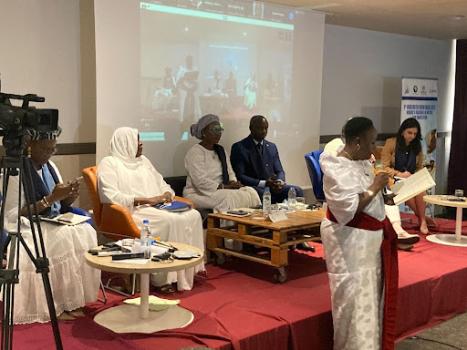Bridging the Governance and Finance Gaps in the WASH Sector
The WASH sector needs to invest 263 billion USD per year to achieve universal access to water and sanitation by 2030. This figure is more than $100 billion USD over previous estimates, reflecting the reality that expenditure has lagged and now is significantly below requirements to meet global targets. One critical element to enable the flow of finance sources to the sector is good governance. Sharing lessons about what works can help to foster future government leadership to accelerate enabling environment reforms.
At the March 2022 9th World Water Forum held in Dakar, Senegal, USAID had a prime opportunity to share such lessons. They facilitated high-level discussions about the role of good governance in financing the sector and met with partner governments.
USAID’s Water, Sanitation, and Hygiene Finance (WASH-FIN) activity hosted a special session entitled “Bridging the Governance and Finance Gaps in the Wash Sector,” led by USAID Acting Deputy Assistant Administrator & Interim Global Water Coordinator, Jeff Goldberg.
Using the examples of two USAID/WASH-FIN supported finance initiatives – the PARC (Rapid Acquisition Projet d’Acquisition Rapide des Camions de Vidange) program in Senegal and the INCA Municipal Debt Fund in South Africa – the session highlighted how government leadership can create an enabling environment to support innovative approaches that attract domestic private finance across diverse institutions. USAID/WASH-FIN provided technical assistance to both initiatives and credit ratings to INCA. Additional examples from Cambodia, Kenya, and Senegal illustrated how technical assistance programs like WASH-FIN can play a critical role in assisting governments to overcome governance obstacles and unlock private finance. In Cambodia, for instance, support from the World Bank led to the government extending private water operator licenses from one to 20 years, which attracted private investment, including commercial borrowing under prior Agence Française de Développement and current WASH-FIN support.
The session discussions prompted compelling reactions from participants. Aminata Ly, Partnership and Communication Director of the Delegation for Rapid Entrepreneurship of Women and Youth (DER) in Senegal (and PARC partner) commented that DER has found value in the “risk mitigation” factor that comes from the many partners involved in the development of the PARC program. Ms. Ly cited the USAID/WASH-FIN expertise in financial aspects of the sanitation sector and the commitment of grant capital from the Bill and Melinda Gates Foundation as a prime example of this benefit. .
Aside from the good governance session, USAID leadership met with government delegations from three high priority countries including Kenya, Uganda, and Zambia. Three common themes emerged from these meetings:
- A focus on non-sewered sanitation through Citywide Inclusive Sanitation and similar public-service approaches. Government representatives expressed significant concern about improved sanitation in schools as countries ramp up free education and enrollment rates increase, particularly in relation to keeping girls in school.
- The ongoing need for well-developed and financed infrastructure that is not only climate-resilient, but also increases operational efficiency for service providers.
- Comprehensive financing mechanisms that enable service providers to attract and leverage the best available public and private resources.
The three themes are aligned with USAID’s global approach to WASH and water security as put forth in the U.S. Government Global Water Strategy and the newly launched President’s Emergency Plan for Adaptation and Resilience (PREPARE), which President Biden announced at COP26 in 2021.
WASH-FIN’s special session and meetings with government representatives provided an opportunity for co-creation of programmatic support. The discussions supported by USAID, OECD, World Bank, CAF, and others acknowledged that bridging the growing finance gap requires an accelerated, concerted effort and commitment to improve governance within and across countries, regions, and globally through development partner coordination.
By Barbara Senkwe, (PhD), Senior WASH Governance Advisor
Read more about USAID’s participation in the World Water Forum
Related Resources

